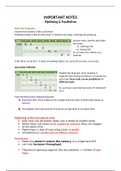Class notes
Lecture Notes Computer Science - Pipelining & Parallelism (systems architecture)
- Course
- Institution
Summary: What is Pipelining? Pipeline Hazards Resolving Pipeline Hazards Current Pipeline Trends Out-of-Order Execution Superscalar Architectures TLP/SMP Multi-core processors Flynn’s Taxonomy SIMD: Vector Processors MIMD issues
[Show more]



